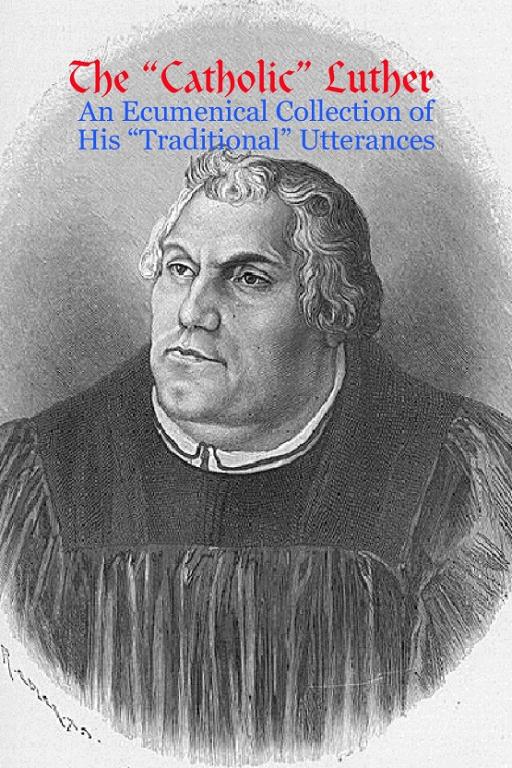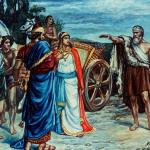
I compiled Luther’s thoughts on these topics, as part of my book, The “Catholic” Luther: An Ecumenical Collection of His “Traditional” Utterances”: published in 2014.
*****
- Suffering and Sanctification
[B]aptism makes all sufferings and especially death, profitable and helpful, since these things can only serve baptism in the doing of its work, i. e., in the slaying of sin. (Treatise on Baptism, Nov. 1519; tr. C. M. Jacobs; in W1)
Who must not be terrified at these words of Paul, in which he plainly states that they who are without the chastisement of God are not the sons of God! Again, what greater strengthening and what better comfort can there be than to hear that they who are chastened are beloved of the Lord, that they are sons of God, that they have part in the communion of saints, that they are not alone in their sufferings! So forceful an exhortation must make chastisement a thing to be loved. (The Fourteen of Consolation, 1520; Pt. I; ch. 6; tr. A. T. W. Steinhaeuser; in W1)
If you suffer because of your sins, then you ought to rejoice that your sins are being purged away. And, besides, were not the saints, too, sinners? (Ibid., Pt. I; ch. 6)
[T]he sufferings which are borne in this faith excel all works of faith. Therefore between such works and sufferings there is an immeasurable difference and the sufferings are infinitely better. (Treatise on Good Works, March 1520; tr. W. A. Lambert; in W1)
He declares that there are no more precious things than suffering, dying, and all manner of misfortune. For they are holy and sanctify a man from his works to God’s works, just as a church is consecrated from natural works to the worship of God. Therefore a man shall also recognise them as holy things, be glad and thank God when they come upon him. For when they come they make him holy, so that he fulfils this Commandment and is saved, redeemed from all his sinful works. Thus says David: “Precious in the sight of the Lord is the death of His saints.” [Ps. 116:15] (Ibid.)
Christ is not mighty within us, his word and his faith are not strong in us, unless our bodies suffer affliction. The false apostles, however, take excellent care to escape suffering. (Sermon for the Second Sunday Before Lent; 2 Corinthians 11:19-33; 12:1-9, 1525; in Serm., v. 7)
[J]ust as we cannot get along without eating and drinking so we cannot get along without affliction and suffering. . . . the gospel cannot come to the fore except through and in suffering and cross. . . . since Christ himself suffered, he also hallowed the suffering of all his Christians. (Sermons I, ed. and tr. John W. Doberstein; Sermon at Coburg on Cross and Suffering, 16 April 1530; in LW, v. 51)
One has to suffer if he wants to possess Christ. (Letters II, ed. and tr. Gottfried G. Krodel; to Philip Melanchthon, 29 June 1530; in LW, v. 49)
But when you are condemned for Christ’s sake, cursed, accused, slandered, plagued, – that makes you holy, for it slays the old Adam, and makes him learn patience, humility, gentleness, teaching him to praise and thank God and to be joyful in suffering. That is what it means to be made holy by the Holy Ghost and renewed to the new life in Christ and thus we learn to believe God, trust Him, hope in Him, love Him; as Romans v says, etc. (On the Councils and the Churches, March 1539; tr. C. M. Jacobs; in W5)
- Fasting and Abstinence
After this comes the discipline of the flesh, to kill its gross, evil lust, to give it rest and relief. This we must kill and quiet with fasting, watching and labor, and from this we learn how much and why we shall fast, watch and labor. (Treatise on Good Works, March 1520; tr. W. A. Lambert; in W1)
It is not wrong to fast in honor of the name of an apostle, or to confess during Lent. (Sermon for the Second Sunday in Advent; Romans 15:4-13, 1521; in Serm., v. 6)
Fasting, praying, going to church are good works, if they are done in the right spirit. . . . If you desire to fast and pray like Anna, well and good. But take good care that first of all you imitate her character, and then her works. (Sermon for the Sunday After Christmas; Luke 2:33-40, tr. B. Lederer, 1522; in Serm., v. 1)
- Bodily Mortification
[T]here is no inward repentance which does not outwardly work divers mortifications of the flesh. (The 95 Theses, #3; 31 October 1517; tr. C. M. Jacobs; in W1)
[A]ll mortifications which the conscience-stricken man brings upon himself are the fruit of inner penance, whether they be vigils, work, privation, study, prayers, abstinence from sex and pleasures, insofar as they minister to the spirit. (Explanations of the Ninety-Five Theses, Aug. 1518; tr. Carl W. Folkemer; in LW, v. 31)
[A]fter St. Paul has taught the Romans faith, he begins in Rom. 12,1 to teach them many good works, exhorting them to present their bodies a living sacrifice, holy, acceptable to God, which would be their spiritual service. This is rendered to God in that the body is mortified by fasting, watching and labors, which is done by Anna. All the saints of old have done this, for fasting means all chastisement and discipline of the body. Although the soul is just and holy by faith, the body is not yet entirely free from sin and carnal appetites, wherefore it must be subdued and disciplined and made subject to the soul, as St. Paul says of himself in 1 Cor. 9,27: “But I buffet my body, and bring it into bondage: lest by any means, after that I have preached to others, I myself should be rejected. We also read in 1 Peter 2, 5 that we should offer up spiritual sacrifices, that is to say not sheep nor calves, as under the law of Moses, but our own body and ourselves, by the mortification of sin in our flesh and the discipline of the body. No one can do this who does not first believe. (Sermon for the Sunday After Christmas; Luke 2:33-40, tr. B. Lederer, 1522; in Serm., v. 1)
No one can mortify the flesh, bear the cross, and follow the example of Christ before he is a Christian . . . Then you proceed to the mortification and the cross and the works of love. (Against the Heavenly Prophets in the Matter of Images and Sacraments, Jan. 1525, tr. Conrad Bergendoff; in LW, v. 40)
[T]he apostle considers first the discipline of the body–the mortification of evil lusts. He handles the subject here in a manner wholly unlike his method in other epistles. In Galatians he speaks of crucifying the flesh with its lusts; in Hebrews and Colossians, of putting off the old man and mortifying the members on earth. Here he mentions presenting the body as a sacrifice; . . . (Sermon for the First Sunday After Epiphany; Romans 12:1-6, 1525; in Serm., v. 7)
This is the head and foundation of my doctrine, on which I build and teach love of one’s neighbor, obedience to the civil magistrates and mortification and crucifixion of the body of sin, as the Christian faith prescribes. (To King Henry VIII, 1 Sep. 1525; in LL2)
“Mortification of the flesh” is also, properly, penance. (Instructions for the Visitors of Parish Pastors in Electoral Saxony, Jan. 1528, tr. Conrad Bergendoff; in LW, v. 40)
- Sharing the Sufferings of Christ
[T]he church dies constantly with Christ and celebrates the mystical Passover, . . . (Lectures on Titus, Philemon, and Hebrews; tr. Jaroslav Pelikan [first two] and Walter A. Hansen; this citation from the Hebrews portion, April 1517 to March 1518; in LW, v. 29)
For God’s commands are sweet, when we find that they are to be read not in books alone, but in the wounds of our sweet Saviour. (Letter to Johann Staupitz Accompanying the “Resolutions” to The 95 Theses, 1518; tr. C. M. Jacobs; in W1)
[P]unishments, crosses, and death are the most precious treasury of all and the most sacred relics which the Lord of this theology himself has consecrated and blessed, not alone by the touch of his most holy flesh but also by the embrace of his exceedingly holy and divine will, and he has left these relics here to be kissed, sought after, and embraced. Indeed fortunate and blessed is he who is considered by God to be so worthy that these treasures of the relics of Christ should be given to him; rather, who understands that they are given to him. For tho whom are they not offered? As St. James says, “Count it all joy, my brethren, when you meet various trials” [Jas. 1:2]. For not all have this grace and glory to receive these treasures, but only the most elect of the children of God . . . with the greatest thirst and constant tears we should beg God that such precious relics of Christ, which are the most sacred of all, be given to us . . . (Explanations of the Ninety-Five Theses, Aug. 1518; tr. Carl W. Folkemer; in LW, v. 31)
And this is the true foundation, thoroughly to know Christ’s passion, when we not only understand and lay hold of Christ’s sufferings, but also of his heart and will in those sufferings, . . . (Sermon for Quincagesima Sunday; Luke 18:31-43, 1525; in Serm., v. 2)
If we really wish to be Christians and have eternal life yonder, we can have no better way than the way our Lord Himself had and all the saints, nay, the way He still has. Christ must always bear the Cross; the world will not bear it, but lays it upon Him, and we Christians, too, must bear it so that it may never be empty. (To the Elector John of Saxony, 18 Nov. 1529; in LL2)
Christ by his suffering not only saved us from the devil, death, and sin, but also that his suffering is an example, which we are to follow in our suffering. . . . we should suffer after Christ, that we may be conformed to him. For God has appointed that we should not only believe in the crucified Christ, but also be crucified with him, . . . each one must bear a part of the holy cross; nor can it be otherwise. St. Paul too says, “In my flesh I complete what is lacking in Christ’s afflictions” [Col. 1:24]. (Sermons I, ed. and tr. John W. Doberstein; Sermon at Coburg on Cross and Suffering, 16 April 1530; in LW, v. 51)
Through the suffering of Christ, the suffering of all his saints has become utterly holy, for it has been touched with Christ’s suffering. (Ibid.)
Bibliography
LL2 Luther’s Correspondence and Other Contemporary Letters, Vol. II: 1521-1530; translated and edited by Preserved Smith and Charles M. Jacobs (Philadelphia: The Lutheran Publication Society: 1918).
LW Luther’s Works, American edition, edited by Jaroslav Pelikan (volumes 1-30) and Helmut T. Lehmann (volumes 31-55), St. Louis: Concordia Publishing House (volumes 1-30); Philadelphia: Fortress Press (volumes 31-55), starting in 1955.
Serm. Sermons of Martin Luther, The Church Postils; edited and partially translated by John Nicholas Lenker, 8 volumes. Volumes 1-5 were originally published in Minneapolis by Lutherans of All Lands, 1904-1906. Volumes 6-8 were originally published in Minneapolis by The Luther Press, 1908-1909.
W1 Works of Martin Luther, Volume I (Philadelphia: A. J. Holman Co.: 1915).
W5 Works of Martin Luther, Volume V (Philadelphia: A. J. Holman Co. and The Castle Press: 1931).
***













